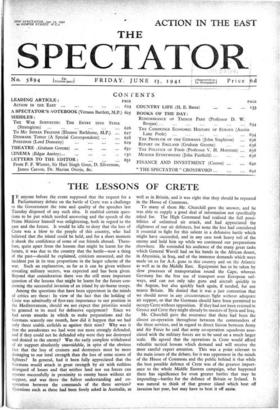THE LESSONS OF CRETE
IF anyone before the event supposed that the request for a Parliamentary debate on the battle of Crete was a challenge to the Government the tone and quality of the speeches last Tuesday disposed of any such idea. It enabled certain ques- tions to be put which needed answering and the speech of the Prime Minister himself was enlightening, both in regard to the past and the future. It would be idle to-deny that the loss of Crete was a blow to the people of this country, who had believed that the island could be held, and for a short moment it shook the confidence of some of our friends abroad. There- fore, quite apart from the lessons that might be learnt for the future, it was due to the country that the battle—now a thing of the past—should be explained, criticism answered, and the incident put in its true proportions in the larger scheme of the war. Such an explanation, so far as it can be given without revealing military secrets, was expected and has been given. Beyond that consideration there was the still more important question of the lessons that might be learnt for the future con- cerning the successful invasion of an island by air-borne troops.
Among the questions that have been uppermost in the minds of critics are these: In view of the fact that the holding of Crete was admittedly of first-rate importance to our position in the Mediterranean, should we not expect that priorities would be granted to its need for defensive equipment? Since we had seven months in which to make preparations and the Germans scarcely one month, how did it happen that we had only three usable. airfields as against their nine? Why was it that the aerodromes we had were not more strongly defended, and if they could not be defended why were they not destroyed and denied to the enemy? Was the early complete withdrawal of air support absolutely unavoidable, in spite of the obvious fact that the loss of cruisers and destroyers must be more damaging to our total strength than the loss of some scores of fighters? In general, had it been fully appreciated that the Germans would attack in great strength by air with ruthless disregard of losses and that neither land nor sea forces can operate successfully in proximity to enemy bases without air support, and was there the fullest understanding and co- operation between the commands of the three services? Questions such as these had been freely asked in Australia, as well as in Britain, and it was right that they should be repeated in the House of Commons.
To many of them Mr. Churchill gave the answer, and he was able to supply a good deal of information not specifically asked for. The High Command had realised the full possi- bilities of unlimited air attack, and had appreciated the slightness of our air defences, but none the less had considered it essential to fight for this salient in a defensive battle which might have succeeded, and in any case took heavy toll of the enemy and held him up while we continued our preparations elsewhere. He reminded his audience of the many great tasks which General Wavell had on his hands in the African desert, in Abyssinia, in Iraq, and of the immense demands which were made on us for A.A. guns in this country and on the Atlantic as well as in the Middle East. Equipment has to be taken by slow processes of transportation round the Cape, whereas Germany has the free use of transport over European rail- ways, and can not only take guns and aircraft quickly to the Aegean, but also quickly back again, if needed, for use nearer Britain. He denied that it was a just contention that we should never in any circumstances 'fight without adequate air support, or that the Germans should have been permitted to occupy Crete without opposition. If they had not been resisted in Greece and Crete they might already be masters of Syria and Iraq.
Mr. Churchill gave the assurance that there had been the closest co-operation throughout between the commanders of the three services, and in regard to direct liaison between Army and Air Force he said that army co-operation squadrons asso- ciated with the military forces are to be used on a much larger scale. He agreed that the operations in Crete would afford valuable tactical lessons which demand and will receive the most careful expert attention. This was a point relevant to the main issues of the debate, for it was uppermost in the minds of the House of Commons and the public behind it that while the best possible defence of Crete was of the greatest import- ance to the whole Middle Eastern campaign, what happened there has significance for even greater battles that may be impending—battles for the defence of Britain or Ireland. It was natural to think of that greater island which beat off invasion last year, but may have to beat it off again.


























